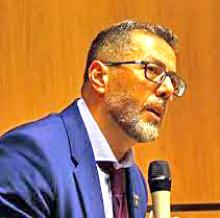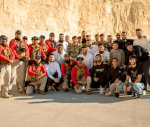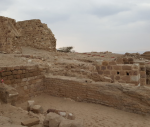You are here
‘Terrorist organisation?’ What’s behind Israeli war on UNRWA
Jul 23,2024 - Last updated at Jul 23,2024
Targeting a school during a war could be justified or, at least, argued to have been a mistake. But striking over 120 schools, killing and wounding thousands of civilians sheltered inside, can only be intentional and horrific war crimes.
Between October 7 and July 18, Israel has done precisely that, targeting with total impunity, United Nations infrastructure in the besieged Gaza Strip.
The price has been horrific. According to UNRWA estimates, at least 561 internally displaced people in UNRWA shelters have been killed and 1,768 injured since the start of the war.
In fact, within a period of ten days, between July 8 and July 18, at least six UN-run schools which have served as makeshift shelters for displaced Palestinians have been targeted by the Israeli army, resulting in the killing and wounding of hundreds.
Historically, UN-linked organisations seemed to be somewhat immune from the impact of war on local populations. The privilege of being neutral outsiders to the conflict, allowed those affiliated with such organisations to carry out their duties largely unhindered.
The Israeli war on Gaza, however, is the primary exception among all modern conflicts. According to UN sources, 274 aid workers and over 500 healthcare workers have been killed.
These figures are consistent with all other numbers produced by the ongoing Israeli genocide in Gaza. Indeed, not a single category of people has been spared: Neither doctors nor civil defence workers, nor mayors or even traffic police.
It was obvious from the very start of the war that Israel wanted to criminalise all Palestinians, not only those affiliated with Hamas or other groups, but the very civilian population and any international organisation that came to their aid.
Blaming and de-humanising all of Gaza was and remains part of an Israeli strategy that would allow the Israeli army to operate without any restraints, and without even the most minimal threshold of morality or respect for international law.
But the Israeli attacks on the UN, all its institutions, but particularly the UN agency responsible for the welfare of Gaza’s refugees (UNRWA), serve a different purpose than that of mere “collective punishment”.
Israel does not attempt to mask or justify its attacks on the organisation as it did during previous Gaza wars. This time around, the Israeli war was accompanied, from the very start, with the outlandish accusation that UNRWA members had participated in the October 7 surprise assault by Hamas and other Palestinian groups.
Without providing any evidence, Tel Aviv launched an international campaign of vilification against the UN organisation which has, for decades, provided educational, medical and humanitarian services to millions of Palestinian refugees.
Sadly, and tellingly, some western, and even non-western governments, answered the Israeli call of punishing UNRWA by withholding badly needed funds, the urgency of which did not only stem from the direct impact of the Israeli war, but the acute famine resulting from the war, as well.
True, a number of governments eventually resumed their funding of the UN organisation, but such action was only taken when much damage had already been done. Additionally, most, if not all, Western governments have not taken any action against Israel for its continued targeting of UNRWA facilities, thus the killing of hundreds of innocent Palestinians in the process.
This non-committal attitude has emboldened Israel to the extent that, on May 29, the Israeli Knesset, (parliament), passed a premilitary reading of a bill that designated UNRWA as a “terrorist organisation”.
Later, on July 18, the Israeli spokesman David Mencer accused the head of UNRWA himself of being a “terrorist sympathiser”.
Israel’s hate for UNRWA, however, is older than the current war. For years, the Israeli government, with the aid of the Trump administration, has labored to shut down the organisation altogether.
Jared Kushner, Trump’s former advisor on the Middle East, said in January 2018 that it was “important to have an honest and sincere effort to disrupt UNRWA”. For him, the dismantlement of the organisation meant the dismissal of the Right of Return for Palestinian refugees.
Indeed, the issue is not just about UNRWA, but rather the historic role the organisation has served as a reminder of the plight of millions of Palestinian refugees in occupied Palestine, the Middle East and across the world.
UNRWA was established through General Assembly Resolution 302 (IV) of 8 December 1949. The founding of UNRWA came one year after the passing of UN Resolution 194, which granted Palestinian refugees the right to “return to their homes”.
Although UNRWA’s mission has turned into a permanent mandate, since Palestinian refugees were not granted their right of return, the role of the organisation remained as critical as it was decades ago.
Since Kushner and others have failed to dismantle UNRWA, the Israeli government has taken advantage of its war on Gaza to achieve the exact purpose. In Israeli thinking, without UNRWA, the issue of Palestinian refugees would lose its main legal platform and would ultimately disappear.
This would give Israel the space and leverage to “resolve” the problem of the refugees in any way it finds fit, especially if it has the full backing of Washington.
Israel must not be allowed to dismantle UNRWA or to dismiss the generational struggle of Palestinian refugees, which is the core of the Palestinian fight for justice and freedom.
The international community must challenge Israel’s vilification of UNRWA and insist on the centrality of the Right of Return for Palestinian refugees. Without it, no real peace is possible.
Ramzy Baroud is a journalist, author and the editor of The Palestine Chronicle. He is the author of six books. His latest book, co-edited with Ilan Pappé, is “Our Vision for Liberation: Engaged Palestinian Leaders and Intellectuals Speak Out”. His other books include “My Father was a Freedom Fighter” and “The Last Earth”. Baroud is a non-resident senior research fellow at the Centre for Islam and Global Affairs.














Add new comment